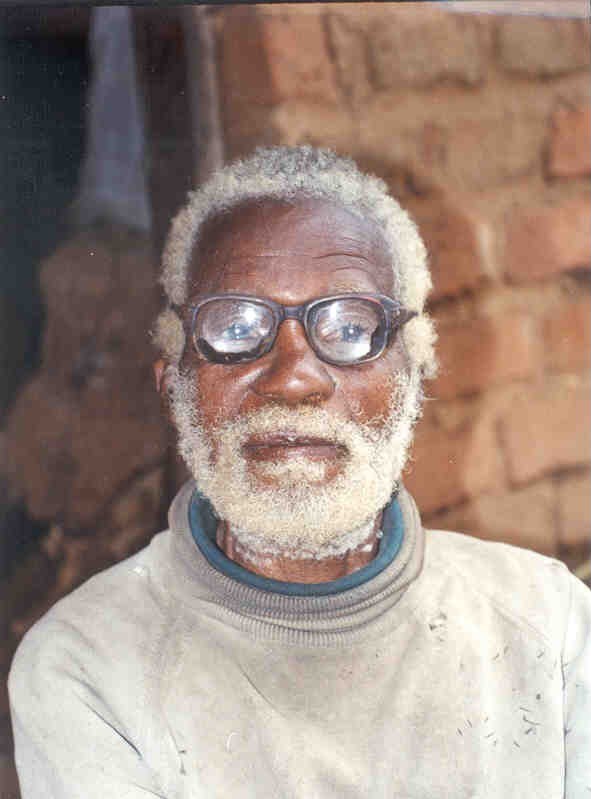Thursday 29th July 04
Eye Hospital
We had agreed to meet with Bambo Semanje at the final bus stop in Jumbe village. Although he could hardly see, Bambo Semanje had assured us that he would be able to walk there from his house. And there he was, bare footed man with white curly hair, bamboo walking stick and hesitant look on his face. After all, he had not been this far for over a year and would not have known how to continue if we had not been waiting for him. It had taken him at least two hours to walk to Jumbe and that was a fine achievement on stony path and road. We were lucky: a proper bus arrived just when we had finished greeting each other and Mambo Semanje was politely allowed to enter first into the bus. We chose the best seats and sat quite comfortably, despite the bus seemingly finding every pothole on the road. What a difference to a mini bus ride: Just two people sitting side by side, without being squeezed like sardines. But when we arrived to Limbe, I realised how far the Blantyre bus stop was - there was no way I could ask him to walk there – so we took a taxi and sat in a relative comfort of the rattling car.
Lion’s Eye Hospital is part of the Queen Elisabeth Government Hospital; donated and financed by the Lion’s Club, as the name implies. Polished floors, well-painted walls and the new furniture looked almost out of place and one could easily believe that this was a private hospital here in Malawi or even outside. We were led to the examination room and felt very fortunate to be in a hospital like that.
Bambo Semanje removed his glasses, those faithful ones that had served him since 1992 when he last visited the hospital for eye testing. He sat quietly and it was impossible to guess what was going on in his mind. Did he believe that they could help him or was he aware of the possibility that his eyes could be beyond help? Different possibilities were hanging in my mind. Maybe he has glaucoma or cataract –that would not be surprising at his age. Maybe I had dragged the poor man all this way just to be told that nothing could be done. But on the other hand, I had to do this, there might be a change and maybe, just maybe he could be helped. Young, handsome Indian optician opened a black box, full of different lenses. He reached for a torch and aimed the light to the patients eyes: “There is no reaction in this eye” I heard him saying. “I cannot do anything for this.” My heart sank. So that’s that, old faithful specks have to continue their service. “But maybe the left eye…” he murmured and a glimpse of hope burst into the air again. “I think we can do something about the left eye” confirms the optician while staring into the eye. He reaches the lenses. Rows of alphabets are on display and a lense after another is changed into the frame. “Bambo Semanje has not been to school so he does not know alphabets” advises Joseph and new rows of E’s appear in front of us. “Could Mr. Semanje tell which way the letters are pointing?” asks the optician in English and Joseph translates to Chichewa. Huge E is lying on its back and Mr Semanje points the ceiling. I can feel slight relief in my throat. There is hope…. “To the door, upward, downward, window….” Bambo Semanje is clearing a letter after letter. This is amazing. I take off my glasses for a comparison: ‘Can I see these letters without the specks?’ I begin to wonder. Yes I can, but only just and on that point Bambo Semanje’s ability to see diminishes.
We move to the next room. The collection of frames and pictures on the wall could be from any Optical shop in Woking. The frame is selected and we wait for the lenses to be fitted. The cost of the spectacles is 2000 kwacha (£10) and for that reason far outside for most Malawians to reach.
On the way home, the white curly head in front of me is moving continuously, looking left, looking right. Maybe our Bambo friend has not seen this landscape for many years and although the view is still a bit foggy for him, the scenery is definitely worth looking.
